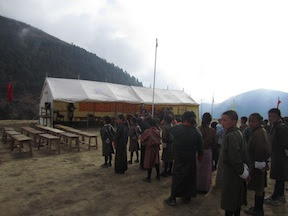


in misted distance
white wings carve, landing lightly
to rest from peaked flight
On Wednesday, Dave, fellow BCF teacher posted to Pakshika MSS in the south, showed up in Rukubji to visit. Amazingly, he got access to a car and survived the roads and distance, and found the insignificant turn off to Rukubji's dirt road in the dark. It was great to catch up and share stories. The next day, after giving Dave the grand tour of the village and environs, which made him exclaim with envy, Martin and Tara showed up from Bumthang. They had, amazingly, caught the bus going toward Thimphu, and after 4+ hours on the road, ended up in Chazam, 4km from Rukubji. We hurried up to meet them for lunch at the hotel/restaurant/store in Chazam. After a great and filling lunch, we headed back to my house and laid out on the grass in the bright sunshine to plan our next moves.
We decided to make a trip to Phobjika to see the Black Necked Cranes that spend the winter there. It is only about an hour and a half away, so we started off around 3:30. As we drove, we passed a Khuru (darts) match in Gangtey, got a little turned around, bought some eggs, finally making it to Phobjika. We knew we were in the right place when, in the distance, we spied white wings in flight. We found the Black Necked Crane center where we spent some time ogling the birds through telescope. As the center closed for the evening, we walked down to the field for a better view. These birds are huge, but we could not get very close, the pictures do not do them the justice they deserve! While I watched them pecking the valley floor or rising and twisting in flight, I thought about how these birds fly across Everest from Tibet to come to THIS valley. What a journey they take, twice a year! The whole valley is protected for the cranes, there are no farms. If I were a crane, I'd come to this valley too. I thought of the intensity and difficulty I undertook for my own landing in Bhutan. I didn't fly over Everest using only the strength of my wings, but I did leave my home and the familiar for an unknown and challenging, but ultimately beautiful experience.
As dusk descended and it became colder, we piled back into the car. As we climbed the passes to Rukubji, a great fog began to grow and obscure the road. We could not see a foot in front of us! Dave did a marvelous job keeping the car on the road and safe from the "abyss" (roads here hug the mountains, thus one side is usually a severe cliff). After one false turn off, we found Rukubji's access road (incredibly). Once back in my house, we all took a moment to breathe normally before starting the bukari and dinner. What joy to have my house full of people, conversation, and music. Martin offered his talents and hooked up my drain in the kitchen, so now, though there's still no indoor water, I can do dishes inside! And he fashioned a stopper for the tub out of wood! A real bath is in my future, if I can heat enough water... He also made me a cutting board from some scrap wood in the shed and gifted me with a loaf of home-baked sourdough bread!
We all spent a night of mediocre sleep laid out around the bukari. In the morning we feasted on Martin's bread, toasted on the bukari, and eggs. Dave left after breakfast, I headed to school for the parent teacher meeting, and Martin and Tara spent the morning exploring Rukubji. When I returned home, I soaked up the sun and their company until they too left to find a ride back to Bumthang on the road.
Now my house is empty again, Angey is still in Thimphu (she'll be back next week I'm told), but I am left feeling the gifts of friendship and a new appreciation for my village life and beautiful surroundings.






